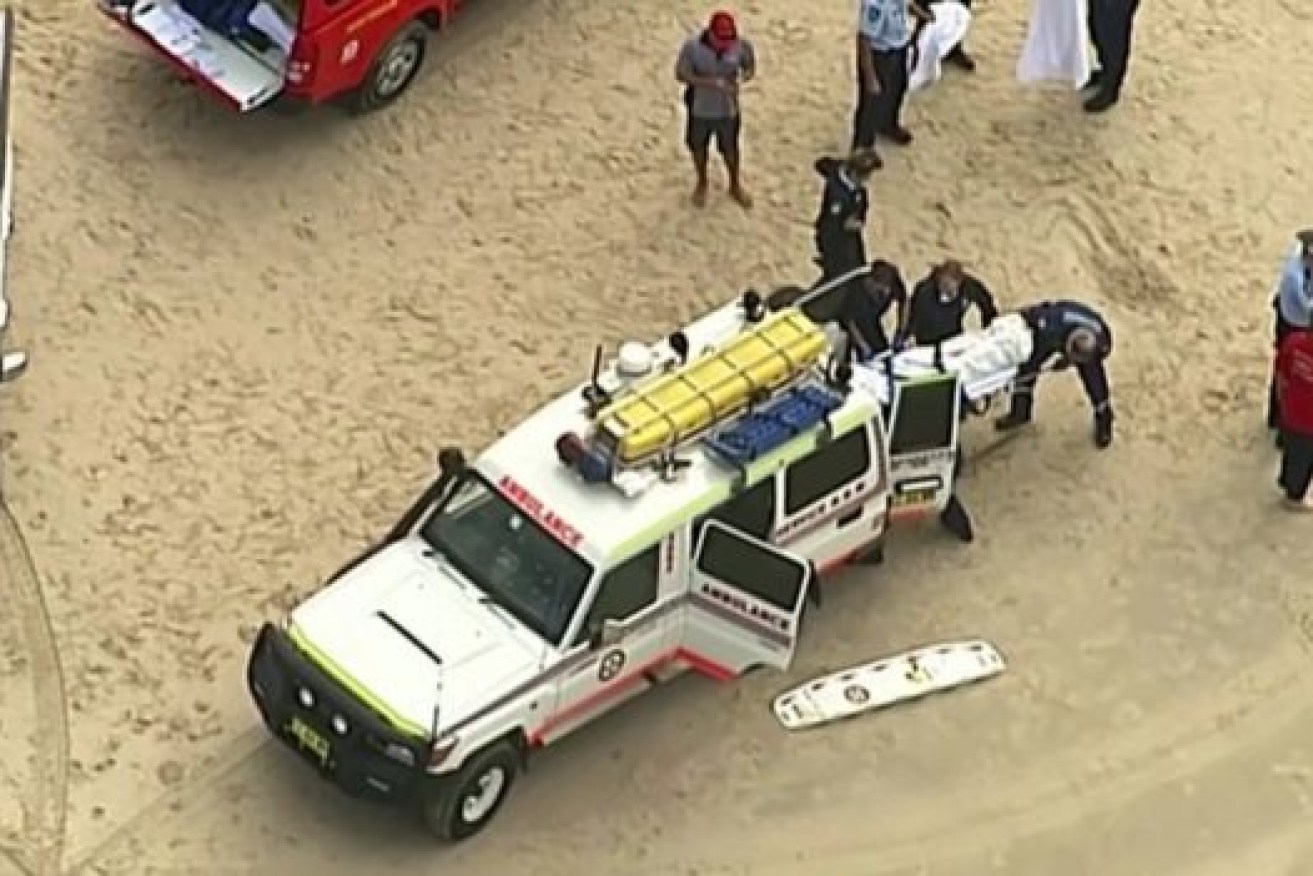Drones, jet skis patrolling coast for killer great white, beaches closed
Drones and jet skis are patrolling northern NSW waters, beaches between Kingscliff and Cabarita remain closed and a surf community is in mourning after a three-metre great white shark fatally attacked a 60-year-old Gold Coast surfer Sunday morning.


Emergency crews attend to shark attack victim Rob Pedretti.
But Gold Coast beaches remain open as monitoring remains on high alert in the hunt for the great white after authorities lost sight of the shark Sunday afternoon.
Rob Pedretti, from Tugun on the Gold Coast, died after being attacked by the shark and suffering “catastrophic injuries” from a bite to the back of his thigh as he was surfing with a friend off South Kingscliff Beach around 10am Sunday.
Surf Life Saving NSW said nearby surfers paddled towards the shark to fight it off and aid Pedretti. The shark reportedly circled the men and rammed one of their boards.
The surfers got Pedretti to shore and administered first aid before ambulance officers arrived, but he died of his wounds at 10.40am.
Tweed-Byron police inspector Matt Kehoe said actions of the surfers who tried to save Pedretti’s life were “ nothing short of heroic.”
NSW Ambulance Inspector Terence Savage said it was a “dreadful” situation for everyone involved.
“When you get a call to attend a shark attack, you never really know the full extent of the damage until you get on scene,” he said.
They did everything they could to try and save his life, but despite their best efforts, were unable to do so.”
While the NSW beaches remain closed following the shark attack, Gold Coast Chief Lifeguard Warren Young said Gold Coast beaches were open.
He said Gold Coast beaches had protection measures in place.
“I don’t think anywhere along our coastline is immune to big sharks coming through, but we’re still watching the beaches.”
Gold Coast beaches are protected by a network of shark nets and drumlines. Beaches along the Tweed Coast are not.
Marine expert, Associate Professor of Environmental Science at Bond University Dr Daryl McPhee, said the risk of shark attack was very low.
While the last fatal shark bite around Kingscliff was in 1964, shark attacks in NSW were more recent and more frequent. Five years ago, surfer Tadashi Nakahara, 41, a Japanese national who lived in the area, was attacked by a shark and died at Shelly Beach in Ballina.
The shark attack on Sunday is the third fatal shark attack in Australia this year. In January, 21-year-old diver Gary Johnson was killed near Esperance, Western Australia, and 23-year-old Zach Robba was attacked and killed off North West Island, 75km northeast of Gladstone in April.
McPhee said surfers and swimmers around the Queensland-NSW border area had a choice of protected or unprotected beaches.
“If you are a surfer on the Tweed Coast or southern Gold Coast area you can make a very easy choice of either swimming at the protected beaches at the Gold Coast or moving further south to unprotected beaches,” McPhee told ABC radio.
“There are also individual deterrents that surfers can use as well that have been scientifically been demonstrated to reduce the risk of a bite,” he said.
NSW Police said permission had been granted under Department of Primary Industries’ shark incident response protocols, to destroy the shark responsible for the attack on Pedretti, but it disappeared from the area Sunday afternoon.
“Due to concerns that the shark had to be fought off by other board-riders, and that it remained in the vicinity for several hours after the attack, police were granted permission to destroy the shark,” NSW Police said in a statement.
“Police and local rescue helicopter crews monitored the area for some hours; however, the shark left the vicinity about 1.15pm and has not been seen since. No police firearm was discharged.”
This article is supported by the Judith Neilson Institute for journalism and ideas













